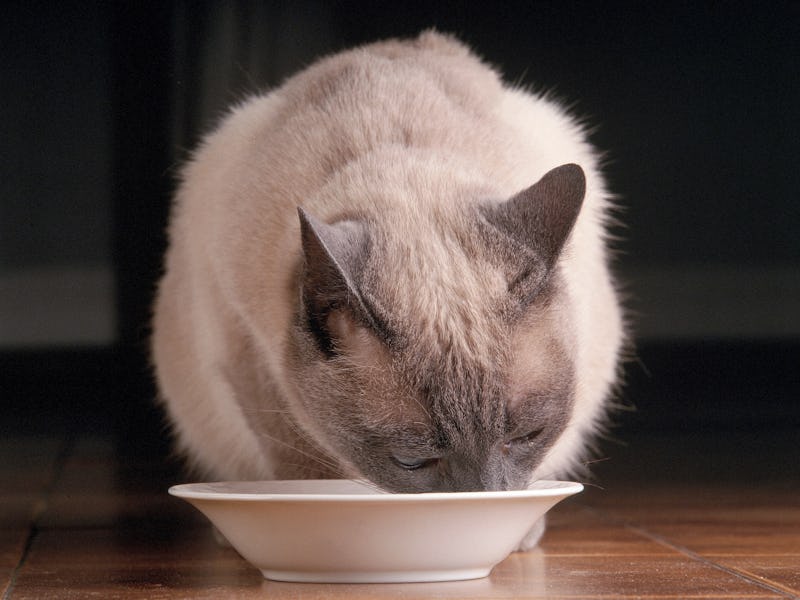Should You Give Your Cat Cow’s Milk? A Veterinarian Reveals The Surprising Answer
Don’t take your cue from The Aristocats.

In the 1970 Disney movie The Aristocats, the genteel felines enjoy a bowl of milk from time to time. Other cartoons depict cats enjoying bowls of full-fat dairy, a privilege that some humans know would wreak havoc on their own stomachs. Disney never shows the potentially grisly aftermath cats may suffer after lapping up lactose.
Maybe it’s crossed your mind to reward your own kitty (for being so perfect all the time) with a nice bowl of milk or cream. Despite representations of cartoon kitties, there are far better treats for your cat. Bruce Kornreich, veterinary cardiologist and director of the Cornell Feline Health Center, explains what Disney doesn’t show us when we give a cat some milk.
Can cats drink milk?
Like all mammals, newborn kittens suckle on their mother’s nutrient-rich milk in their first weeks of life. By 8 to 10 weeks of age, Kornreich tells Inverse, they’re usually eating solid food.
Milk contains the sugar lactose. Mammals with the enzyme lactase are able to digest lactose, but many lose it as they age. Kornreich says while cats need the ability to digest lactose when they’re younger, losing this ability is natural. As they wean from suckling, that’s when they lose the ability to break down this sugar. “Presumably, that’s an evolutionary adaptation to transfer from a liquid to a solid diet,” he says. As a result, “most cats are lactose intolerant to some degree.”
Cats may also be sensitive to another component of milk, the protein casein. Kornreich says that “while we don’t know the prevalence” of this sensitivity, it’s “similar to a food allergy” in that they have an immune reaction to this protein. The immune system doesn’t recognize casein, so it creates a response to the foreign protein. So not only do cats lose the ability to digest lactose, but their immune systems react to the presence of casein, reinforcing that felines biologically outgrow the need for milk.
Of course, that won’t stop a cat from slurping on some milk if it’s available and whets their palate. “Can cats drink milk? Sure. But should they? No, we don’t believe they should,” Kornreich says.
What happens if a cat drinks milk?
Without lactase to break down lactose, the sugar stays in the gastrointestinal tract. There, it ferments, producing gas while drawing water into the GI tract. That gas turns into nasty flatulence. As for the excess water? That becomes diarrhea. If you give milk to your cat, there’s a fair chance he may fart up a storm and suffer from the runs, both of which can make him uncomfortable.
If your cat does get diarrhea (from drinking milk or otherwise), pay attention to how long it lasts. “Some people are flippant about diarrhea,” Kornreich says. While occasional, one-time diarrhea isn’t necessarily worth fretting over, prolonged diarrhea can dehydrate your cat and lower blood electrolyte levels. “Any significant amount of diarrhea should be a cause for concern,” he says. If slurry-like poops persist for more than two days, that’s high time to see the vet.
What should I give cats instead of milk?
If you happen upon a mewling stray, don’t set out a bowl of milk. It’s much more intuitive than that. Cats are “obligate carnivores,” Kornreich says, which means meat needs to be a part of their diet. Some wet cat food and water will suffice, and “the best thing to do is consult a vet,” he adds, because this cat probably needs a checkup and shots.
As for abandoned kittens, kitten milk replacer (KMR) formulas are available and may be a good option. These products are “designed specifically with the nutritional needs of kittens in mind,” Kornreich says. These drinks, often powdered, contain vitamins and minerals that kittens would otherwise get from cat milk. This route is “likely what the vet will recommend,” especially if the kitten is still very young and not weaned.
We all love spoiling our kitties. Pouring a fresh bowl of milk might seem like putting them in the lap of luxury, but it can do some serious harm. “In our desire to make them feel happy and healthy and comfortable, we can actually cause them distress,” Kornreich says. “If you want to make them feel good, give them a nutritionally balanced diet.”
This article was originally published on